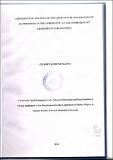Assessment of the role of the church in re-integration of Ex-prisoners to the community: A case of protestant churches in Nakuru town.

View/
Date
2018-10Author
Ngeno, Stephen Kiprono
Type
ThesisLanguage
enMetadata
Show full item recordAbstract
The church is ordained by God to preach .the Good news to the needy and to heal the broken hearted and proclaim freedom for the captives and release from darkness for the prisoners .. The church is called of God to provide hope to those who are hopeless and to transform the lives of those who are crooked to come to the light of Jesus Christ. Therefore it goes without saying that the church has a great stake in the rehabilitation of prisoners and in the reintegration of the same back to the community. Kenya prisons have engaged fully in rehabilitation of prisoners by providing them with skills that would help them when they get out of prisons to earn a living. Howe er this has not helped the prisoners who are exiting out of prisons to reintegrate successfully with the community which in one way or the other they offended. There are a lot of incidences reported where ex-prisoners are lynched by the public upon stepping out of prisons and others are brought back to the prisons either because of committing crime or on mere suspicion from the fact that they just came from prison. The study assessed the role of the church in reintegration of prisoners back to the community. The study was guided by three objectives; church programs that are geared towards reintegration of prisoners, the socio-economic activities that the
hurch has towards a prisoner and the perception of the church towards a prisoner.
The used theories; theory of behavior change, desistance theory and social control theory to gain insights and more understanding of the research. The study adopted descriptive study method. The researcher undertook research among the 50 pastors, 150 deacons from 50 protestant churches in Nakuru town and 40 ex-prisoners. Deacons were subjected to random sampling whereby a sample of 60 was obtained. Therefore, 150 respondents were engaged in the study. Data was collected by use of a questionnaire containing closed ended questions. It was analyzed and interpreted using descriptive and inferential statistical techniques through aid of statistical packages for social science (SPSS) version 23. Descriptive findings showed that Churches perception, programs and social economic activities contributes to reintegration of ex-prisoners. Results further indicated correlation coefficient of (R=0.827) meaning that the independent variables were strong and suitable predictors of the dependent variable. Regression analysis findings indicated that all independent variables taken together (t=3.611; p<0.01) had strong and significant relationship with Reintegration of ex-prisoners. It was recommended that Churches should consider putting reintegration programs into the list of their important operations and expand involvement into social economic activities for the prisoners.
Publisher
KeMU
